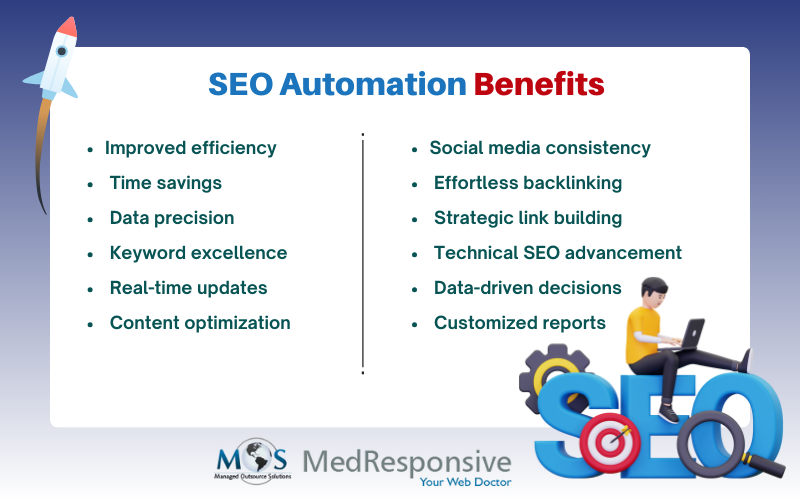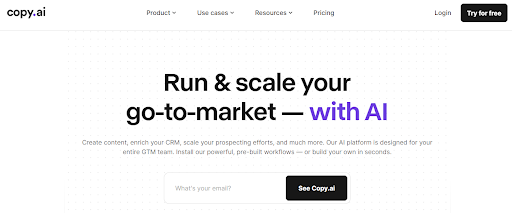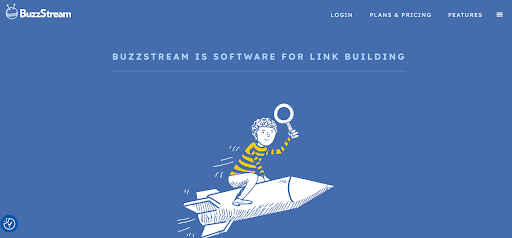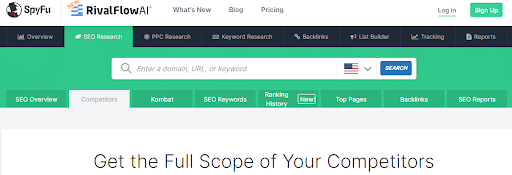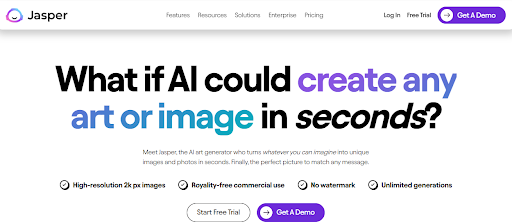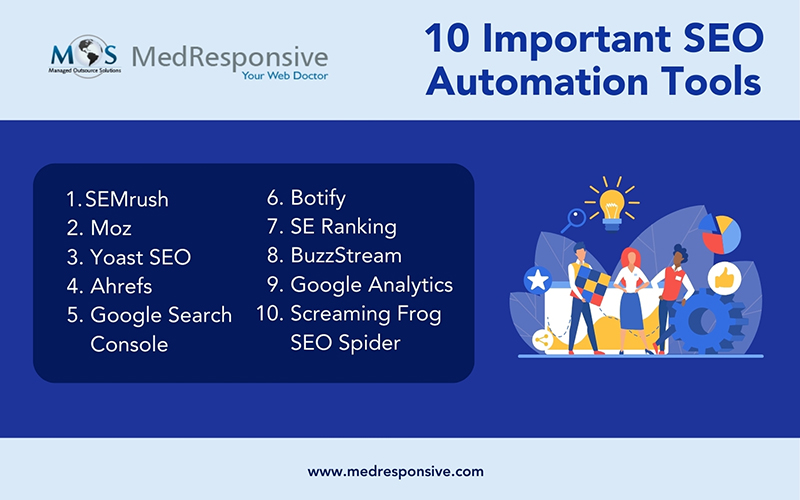Did you know that lead quantity rises by 80% for those using marketing automation (Oracle). Yes, we’re discussing the automation in digital marketing. Is it possible to automate the complex process of search engine optimization? Buckle up, because today we’re diving into the fascinating world of SEO automation, exploring what it is, what elements can be automated, and whether it might be the secret weapon your website needs to dominate the search results.
Want to make the SEO process automatic and reduce human labor through the use of tools, software and other programs? Then consider SEO automation. Being a provider of professional SEO services, MedResponsive is up to date with the changing online marketing standards.
What Is SEO Automation?
SEO automation refers to automating repetitive SEO tasks that were once done manually.
Automation process involves using tools and software to streamline and enhance various aspects of the optimization process.
Making the SEO process automatic by reducing human labor through the use of tools, software and other programs is referred to as SEO automation. By automating the time-consuming and labor-intensive SEO processes, you can focus on more significant projects within your digital marketing campaign. SEO automation tools are mostly designed to compile a wide range of findings into one dashboard, which makes it easier to consume and use information.
Benefits of SEO Automation
Considered as deployment of a factory line-up in your SEO marketing, SEO automation should be included in your digital marketing campaign as it allows you to spend more time on the creative aspects of optimization and enjoy the best results.
Here are some of the benefits of automating SEO tasks:
- Enhanced efficiency – Automate repetitive tasks, and allow your team to focus on strategic SEO initiatives.
- Time savings – Streamline processes, saving valuable time and accelerating the pace of optimization efforts.
- Accurate data analysis – Utilize automation tools for precise data analysis, ensuring accurate insights into website performance.
- Improved keyword research – Automate keyword research to identify trends, gaps, and high-value opportunities effortlessly.
- Real-time monitoring – Receive instant notifications and real-time updates on website performance and search engine rankings.
- Content optimization – Automate content audits to enhance on-page SEO elements and improve overall content quality.
- Consistent social media presence – Schedule and automate social media posts for a consistent online presence and improved brand visibility.
- Effortless backlink analysis – Automate backlink analysis to identify new opportunities, monitor competitor activity, and manage link profiles effectively.
- Strategic link building – Streamline link-building efforts by automating outreach, tracking responses, and managing link-building campaigns efficiently.
- Technical SEO enhancement – Automate technical SEO audits to identify and address issues related to site speed, mobile-friendliness, and crawlability.
- Improved user experience – Use automation to optimize website elements for a better user experience, contributing to higher search engine rankings.
What SEO Elements Can Be Automated?
Now that we have covered what SEO automation is and its benefits, you’re probably wondering what processes you can automate for your business. Though it’s amazing to have one tool that can take care of your SEO needs, you have to be strategic about which elements you need to automate. This is very important because automation just streamlines your efforts. It doesn’t replace hands-on analysis and activity.
Here are the main elements in your SEO campaign that you can automate without any worries:
Keyword research – Automating keyword research through AI tools revolutionizes the traditional approach, significantly enhancing efficiency and precision. Using the power of artificial intelligence, these tools can analyze vast amounts of data, identify emerging trends, and uncover high-value keywords with unprecedented speed. Machine learning algorithms enable the system to learn and adapt continuously, ensuring that the keyword suggestions remain up-to-date and aligned with evolving search patterns.
Image Source
By automating the keyword research process with tools such as Semrush, Google Ads Keyword Planner, and Twinword Ideas, businesses can save valuable time, and enable marketing teams to focus on strategy implementation rather than manual data crunching. These tools provide a comprehensive list of relevant keywords and offer insights into user intent, helping businesses tailor their content and SEO strategies for maximum impact.
Content creation – Creating content using AI tools revolutionizes the way businesses generate valuable and engaging materials. In a matter of seconds, AI writing tools such as Jasper, Copy.ai, and ChatGPT effortlessly craft captions, headlines, and other text-based content for your social media posts. By analyzing your input, including audience details and brand preferences, these tools create contextually relevant content tailored to resonate with your target audience.
Image Source
AI-driven content creation involves analyzing vast datasets, understanding context, and learning from patterns to produce high-quality articles, blog posts, or product descriptions. These tools can tailor content to specific audiences, ensuring relevance and resonance. Not only do they enhance efficiency by reducing the time spent on manual content creation, but also contribute to consistency in tone and messaging. Automating content creation with AI tools empowers businesses to stay agile in the fast-paced digital landscape, meeting the demands for frequent, relevant, and engaging content across various platforms.
Backlink Analysis – An essential part of any SEO campaign, backlink analysis allows you to see who is linking to your site, which helps to improve your site’s trust and authority, and leads to increased rankings. For a website with lots of pages, it can take a long time to check each page and all the backlinks you earn.
Image Source
AI tools such as SEMrush, BuzzStream, Respona, and Pitchbox can automate backlink analysis and transform the process of evaluating and managing link profiles. These advanced tools utilize artificial intelligence to swiftly analyze extensive datasets, assessing the quality and relevance of backlinks. They can identify patterns, anomalies, and potential opportunities more efficiently than traditional methods. AI-driven backlink analysis goes beyond simple metrics, considering factors such as context, authority, and relevance, providing a more nuanced understanding of a website’s link profile.
Competitor monitoring – It’s really challenging to keep track of all your competitors (if you have a lot). Automation tools such as – Cohesive, Elicit, Crayon, and SpyFu can help in analyzing competitor websites and find ways to outrank them in search.
Image Source
AI-driven competitor monitoring goes beyond basic data collection, providing insights into trends, market positioning, and potential strategies. By continuously learning and adapting, these tools can identify patterns and anomalies in competitor behavior, helping businesses make informed decisions to stay ahead in the competitive landscape. With real-time alerts and comprehensive analytics, AI tools empower organizations to proactively adjust their strategies, seize opportunities, and maintain a competitive edge in their respective markets.
Rank Tracking – The primary purpose of SEO is to rank highly in search engines for target keywords. However, when you have hundreds of pages on your website and you’re trying to rank for multiple keywords, it’s really challenging to keep up with each page’s ranking manually.
Image Source
To simplify the process, you can automate this element using an SEO automation tool, such as SE Ranking. It helps to track all your pages’ rankings, both new and old, to see how their rankings change or improve over time. It also helps you figure out which tactics are working and which ones aren’t.
Image optimization – Automating image optimization using AI tools brings a new level of efficiency and precision to the process of enhancing visual content. These tools use advanced algorithms to automatically analyze and optimize images for factors such as size, format, and quality. Through machine learning, they adapt to specific content types and tailor optimizations for optimal performance.
Image Source
AI-driven image optimization tools such as Jasper Art, Gigapixel AI, and Deep AI goes beyond basic compression, considering elements like content relevance and context. By automating this process, businesses can significantly reduce the manual effort involved in image preparation for websites, applications, or social media. The result is not only faster loading times but also visually appealing content that resonates effectively with the target audience, contributing to an enhanced user experience.
10 Valuable SEO Automation Tools
Let us also check out the important tools you should have in your arsenal for creating effective SEO strategies much faster.
Selecting the right tools for SEO automation is a crucial step that requires careful assessment of the specific needs and objectives of your website or business. You can consider using digital marketing services to make the process hassle-free and efficient. Begin by identifying the key areas of SEO that align with your goals, such as keyword research, on-page optimization, backlink analysis, or technical SEO. Consider the scalability and flexibility of the tools to ensure they can adapt to the evolving landscape of search engine algorithms. Look for platforms that offer user-friendly interfaces and seamless integration with existing workflows. Additionally, prioritize tools that provide actionable insights, robust reporting capabilities, and, where applicable, AI-driven features for enhanced efficiency.
Achieve peak performance online! Schedule your SEO strategy session!
Your success begins now!


